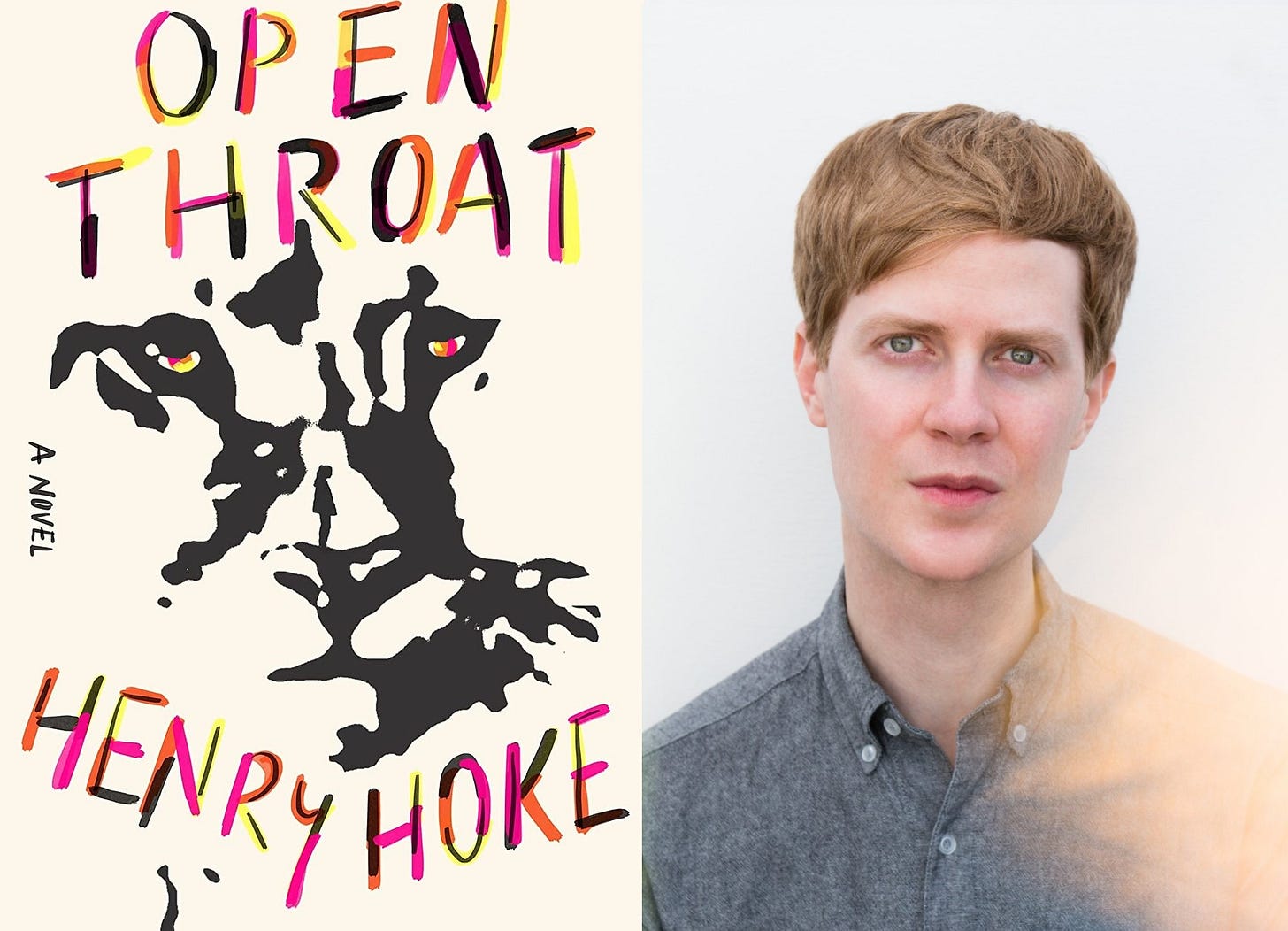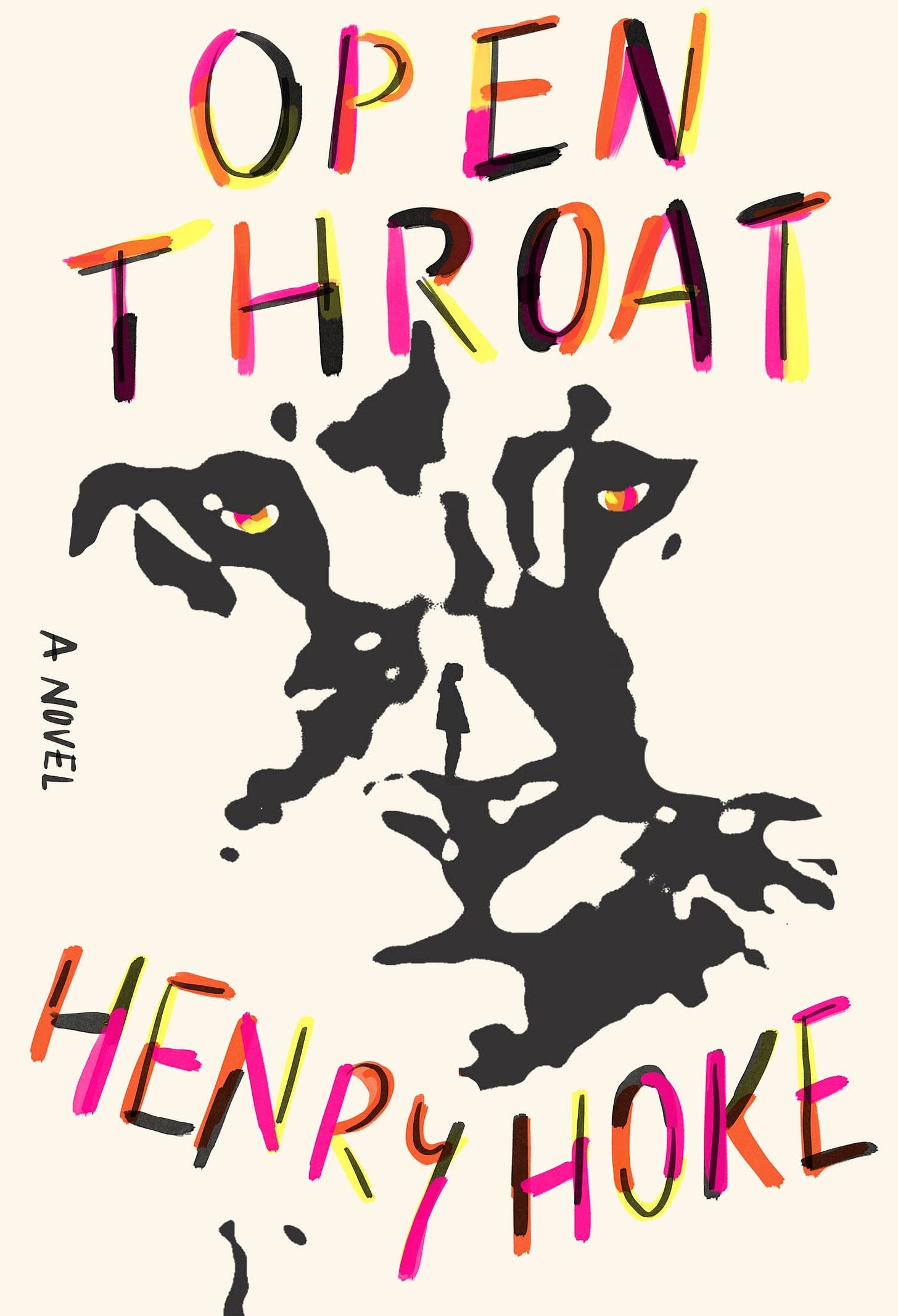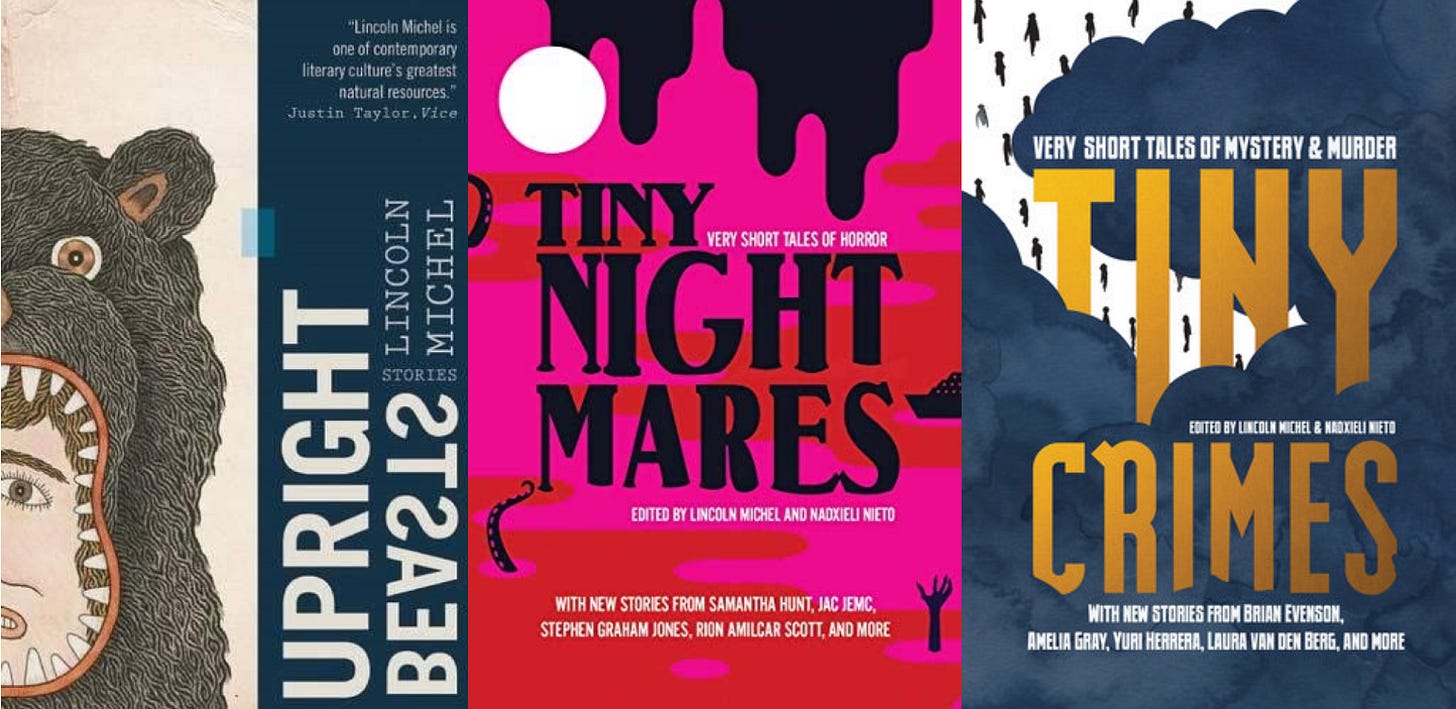Processing: How Henry Hoke Wrote Open Throat
"I did a daily silent meditation before writing, placed myself mentally in the place my mountain lion was about to find themselves."
On a semi-regular basis, I interview authors about their writing processes and craft—you can find previous entries here—and this week I’m very excited to talk with Henry Hoke about the strange, hilarious, and moving novel Open Throat. Hoke and I actually grew up together in central Virginia, so it’s especially gratifying for me to see this novel garner acclaim and attention. But even if I didn’t know Hoke, I’d have loved Open Throat. Written in the voice of a queer mountain lion stalking the Hollywood hills, based in part on a real mountain lion named P-22, the short novel walks a fine line between experimental and propulsive, lyrical and relatable. It—if you will excuse the obligatory pun—will dig it’s claws into you from the first page.
I asked Hoke about writing process, immersive theater, and bending genres.
Open Throat grabs the reader from the first line with the lion-narrator’s voice: “I’ve never eaten a person but today I might.” The voice is funny and moving, at turns weird or wild or contemplative, and just a charming character the reader wants to follow. How did you think about the lion’s voice? Did you have to do anything to “get into character” when writing?
I did a daily silent meditation before writing, placed myself mentally in the place my mountain lion was about to find themselves. I opened my eyes, put on the same record (Wander/Wonder by Balam Acab – a drippy, nocturnal record), and began. In those circumstances the lion’s voice felt very close to my voice, their isolation and frustration with humanity reflecting mine. The character came alarmingly naturally.
Although the book is a novel, it is written almost as a series of prose poems or vignettes without punctuation. What informed your formal decisions? And did the form of the book affect how you wrote it? (For example, Mary Robison’s Why Did I Ever is another novel that’s a series of prose poems or flash fictions which Robison wrote on notecards in short bursts.)
Ever since grad school at CalArts (working with Matias Viegener and Maggie Nelson) I’ve been drawn to fragmentary writing, especially approaches that hybridize forms into something distilled. The line-breaking and not-punctuating felt right for the present tense cascade of my big cat’s expression. It flowed that way in the word doc, and I decided to stick with it. It kept me writing, and I imagine it keeps people reading.
I know you have a love of and background in theater, especially immersive theater events. You created these yourself with ENTER>text. Did immersive theater inform your writing of Open Throat in any way?
There’s a dream-like, ecstatic sequence in each of my books that reflects my encounters with immersive theater (especially the company Punchdrunk). Open Throat’s had to be at a certain magical theme park, because we’re in SoCal, after all.
Could you imagine an immersive event version of Open Throat?
Absolutely. I always wanted to – and at one point got close to – staging an event in an LA wilderness. My friends Sara Finnerty Turgeon and Anne-Marie Kinney curated a reading series in Griffith Park for many years, and that’s how I ended up performing work, and encountering it, in the caves of Beachwood Canyon, or the abandoned cages of the old LA zoo. The phantom of my lion was close.
Can you talk about the process of writing Open Throat from first concept to publication? How long it took or how much it changed over the course of revisions? Anything you feel willing to share.
I conceptualized Open Throat as a cheat book, to avoid writing a more traditional story collection which I still haven’t finished. After hearing a Nick Cave song that mentions a cougar in the Hollywood hills, I was hit like a bolt of lightning by the urgency of the potential voice, and I began writing the next day. I’d returned to Brooklyn after 11 years in LA, and had so much to process, ferally, about that strange time. It took that first real winter back east, writing a few pages every weekday, November-February, to create a draft. I sharpened the language and perspective with my signif, who is my first reader. The same week the manuscript was complete, I sold my NYC novel The Groundhog Forever, and was contracted by Bloomsbury to write my memoir Sticker. So, I suddenly had books slated to come out in 2021 and 2022. In this deluge, it occurred to me that I could be patient with Open Throat, publication-wise. I knew it was immensely pitch-able (one line – queer mountain lion in LA), and so I decided to approach an agent who a dear friend had recommended (I’ve never been agented before). He loved the book. He also knew it was a bizarre proposition for mainstream publishing. I told him cool, that’s the point. Then Covid hit. 18 months – a novel tour on zoom, an exhausting research-and-writing process for Sticker – later, the agent hit me up again, and after some more stubbornness on my part, he was ready to roll. We sent the book out, unchanged from the March 2020 manuscript. Some incredible editors got in touch with me. There was an auction. I learned more about big 5 publishing in a week than I ever thought I’d know. My dream press, MCD/FSG, and my ideal editor Jackson Howard, were my chosen match. Our editorial process was very fluid over the course of 2022, and he really helped me make imaginative changes to structure, weaving flashback and present moment in poetic ways. He encouraged me take pauses for reverie in the propulsive plot. The greatest gift that resulted was the penultimate passage (between cliffhanger and climax), which he intuited, for pacing, we needed. To fill that space, I wrote something I had previously been afraid to write (a vision of a post-human world), and I’m so glad I did.
When it comes to revision, I feel like most writers either write very long and loose first drafts and then pare down, or else they write skeletally and flesh it out with the narrative muscles and organs and skin. Is that true for you? Or did Open Throat come out largely in the shape it was published in?
Yeah, I would say I write the muscle and circulatory system only, what wraps around the skeleton. I seldom flesh out or pair down. It takes a patient practice, just writing the gooey parts when they occur to me, and letting them stay that way, but it worked well for Open Throat.
The novel is in one way a very lyrical and experimental book. But it also has taut chapters and a great sense of propulsion that’s in a strange way almost thriller-like. How did you think about “plot” in this book?
I knew the major plot points going in. Many were drawn from the real-life journey of the LA cougar P-22 (crossing the 405 freeway, living under a house in Los Feliz, *allegedly* eating a koala). The structural elements I added anchored the rest: the obvious apocalyptic LA-staples of earthquakes, mudslides and wildfires, and then the more deeply personal like escaping a violent father, mourning a gay crush, bonding with a gender-affirming witch, and, crucially, fixating on a human nemesis. Having these powerful guideposts freed me up for reverie, expression, and sensemaking in a more poetic way throughout.
You’ve published several books that jumble genres in various way (poetry, memoir, fiction, etc.). When you start a project, do you think about what genre (or genres) you want to write in?
Aside from my first two collections (one more hybrid-prose-poetic-memoir, the other formally experimental short stories), I’ve been solidly writing either a novel or a memoir. But within those formal goalposts I’m never afraid to just call them a book and let the insides mutate.
Is there a genre or form you haven’t written in yet but would really like to?
I want to get deep into the “lush rot” (as you once beautifully named it) of our youth from a purely fictional perspective, so I’m going southern gothic. A 90s novel about doomed middle schoolers in suburban Alabama. This book also has a non-human narrator, though a radically different one than Open Throat. Human voice just isn’t the move for me these days.
If you like this newsletter, consider subscribing or checking out my recent science fiction novel The Body Scout that The New York Times called “Timeless and original…a wild ride, sad and funny, surreal and intelligent.”
Other works I’ve written or co-edited include Upright Beasts (my story collection), Tiny Nightmares (an anthology of horror fiction), and Tiny Crimes (an anthology of crime fiction).






This was an excellent read. Thank you, Lincoln.
I'm intrigued with Hoke's process, and how he evoked the voice of his creature via short meditations. I'm trying to solve a similar predicament with my Dahmer novel -- although given a choice I'd rather be stranded in a mountain lion's brainpan.
On a side note: As you demonstrate here, I wish more Substackers would keep their posts concise and succinct. Too many authors are writing now, without editors (and their [the editor's] red pencil).
I just finished Open Throat last week and haven't been able to put it out of my mind. Great questions and conversation around such a spare, yet rich story. Definitely will be reading more by him.